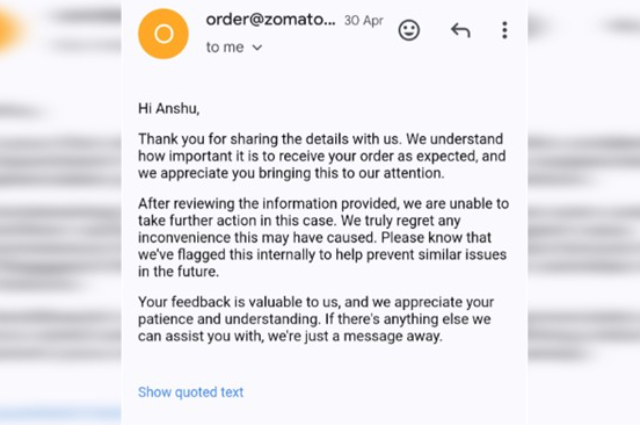
This Holi, now three months ago, I placed an order through Blinkit. But the item delivered wasn’t even edible. I complained, and within five minutes, the delivery partner was right outside my home to collect the item back. My mother smiled and said, “What a quick service!”
At that moment, it truly did feel impressive, especially since Blinkit was still new in our city. But the truth is, speed only works in one direction: when they take your money. That quickness disappears the moment you ask for a refund, even if the fault is clearly theirs. It’s been three months, and I still don’t know what happened to that refund.
My father, who prefers using cash for everything, saw me sending email after email, attaching screenshots as proof. Yes, I eventually got a call. But there was no clarity. My transaction history still shows only the money deducted, not a single sign of the refund for that order. Then he said something that stayed with me: “Yeh galtiyan paise lete waqt kyun nahi hoti?” (Why don’t these mistakes happen when they take our money?)
That line hit me. And it hasn’t left me since.
This wasn’t a one-time thing. In April, I placed a late-night order through Zomato. One item was missing from the delivery. I immediately filed a complaint with screenshots.
After several email exchanges, this is what I received:

Zomato’s official response after multiple follow-ups
"Thank you for sharing the details with us. We understand how important it is to receive your order as expected, and we appreciate you bringing this to our attention. After reviewing the information provided, we are unable to take further action in this case. We truly regret any inconvenience this may have caused. Please know that we've flagged this internally to help prevent similar issues in the future. Your feedback is valuable to us, and we appreciate your patience and understanding. If there's anything else we can assist you with, we're just a message away."
That was it. No refund. No resolution. Just a carefully written response that ultimately meant nothing.
There is nothing different with Swiggy either. They always promise to respond within the next 24 hours, but that response never comes. This isn’t something that happened to me just once. Unfortunately, it won’t be the last. It has become a pattern. Refunds never arrive with the speed of their automated replies.
Sometimes, the amount feels too small to care about. Other times, you’ve already spent so much time explaining the issue, rewriting the same email, attaching the same screenshots, and checking again and again if a refund has come. But it never does.
I’ve lost count of how many times money has gone to waste in such incidents. And probably none of us has ever really calculated how much we’ve lost in total. Each amount seems small at the time, but when compounded, it adds up to something much bigger.
The Central Consumer Protection Authority (CCPA) is currently investigating the cancellation policies of food delivery platforms such as Swiggy and Zomato, based on a report by Moneycontrol, as per an article written by MediaNama. This investigation was prompted by complaints filed on the National Consumer Helpline, with 10,590 complaints against Swiggy and 7,938 against Zomato. The data clearly highlights a significant lack of transparency in how these food delivery platforms operate.
Their cancellation and refund policies are often hidden in lengthy policy pages written in complex language that most of us never even think to read. Since these policies are never communicated clearly at the time of placing an order, it allows these platforms to effectively shield themselves from taking accountability.
Since these platforms hide their policies, both customers and restaurant partners are left in the dark. Consumers and restaurants often don’t understand why they face such losses or issues, and there is no clear redressal mechanism available for either consumers or restaurant partners.
These food delivery companies have surely made us rely on them, while being unreliable themselves. Most of the time, we don’t even realise what we’re agreeing to, what permissions we’re giving, and what policies we’re silently accepting. It’s not just the lack of human response that makes people feel neglected; many feel cheated, even betrayed. And whether these companies realise it or not, the biggest thing they lose in the process is trust.
That trust is the very foundation their entire business runs on. More than alluring offers and catchy one-liner notifications all day long, what customers truly need is clarity. We need clarity on what we’re saying yes to. And restaurant partners deserve clear, easy-to-understand terms and conditions, not hidden clauses.
What we need is transparency. What we need is accountability, especially when these platforms are at fault. We also need human communication. There must be a way to raise our issues, get timely responses, and receive refunds, because it is our right.
Behind every complaint is a consumer or a restaurant partner who earns and spends their hard-earned money. They choose to spend because they value the services these platforms offer, but no one deserves to feel unseen and unheard in return.
This leads to frustration and, often, wasted money. When issues arise, users are met with silence from the platform. Automated replies leave both customers and restaurant partners feeling helpless. Even receiving a basic response can feel like a losing battle against the entire system.
Because we are so dependent on these services, the convenience often makes us forget the larger issue: questioning the system behind them. We feel frustrated for a few hours or days and then move on, telling ourselves this is just how it works. What we don't realise is that it works this way because we have allowed it to.
The amount lost may seem small at the time, and the battle feels like a lost cause, long, difficult, and isolating. But as these issues build up, a deeper problem becomes clear. There is a lack of respect for our time, our money, and the service we deserve in exchange.
When these platforms grow rapidly, their accountability should grow too. Yet that remains one of the biggest missing pieces of the puzzle.
